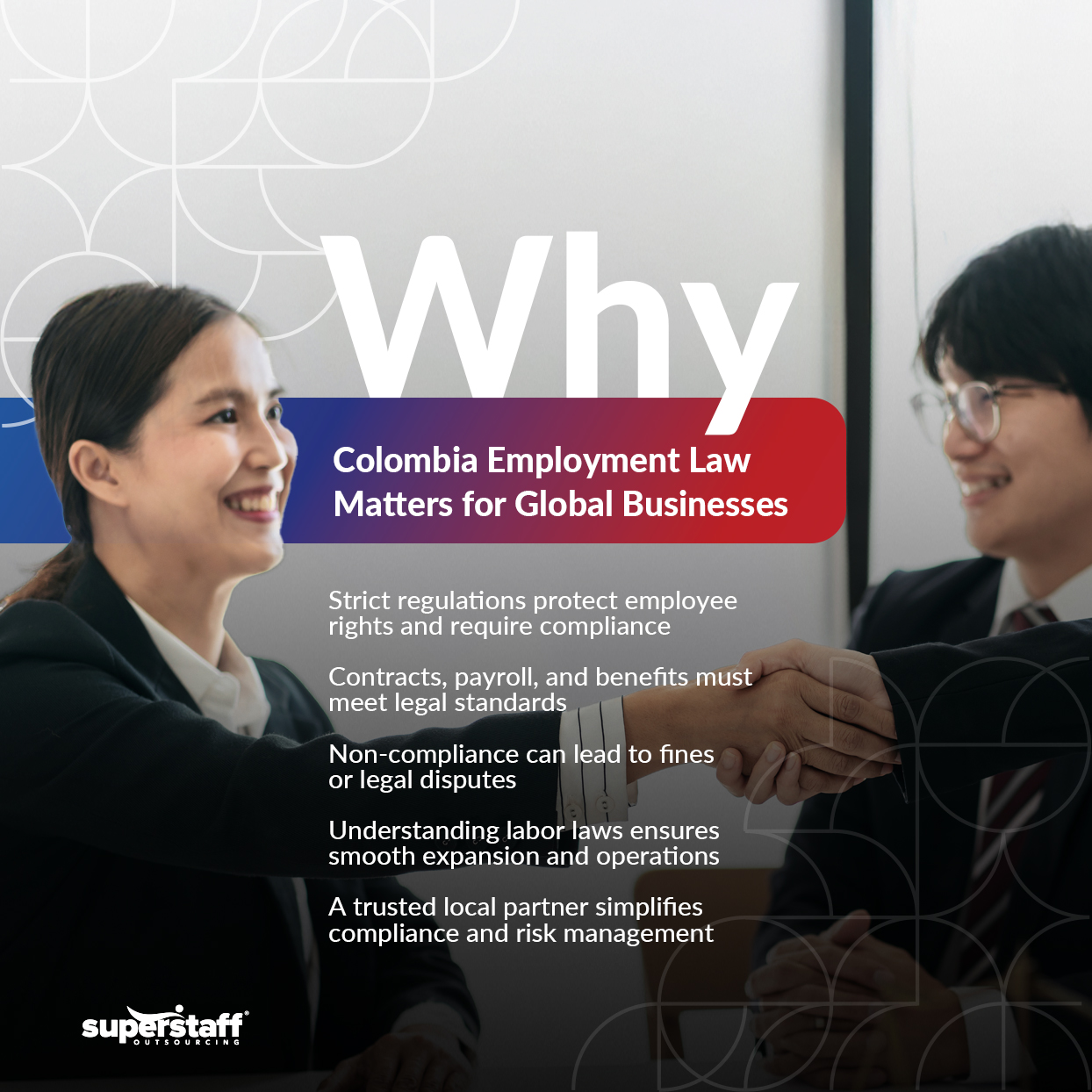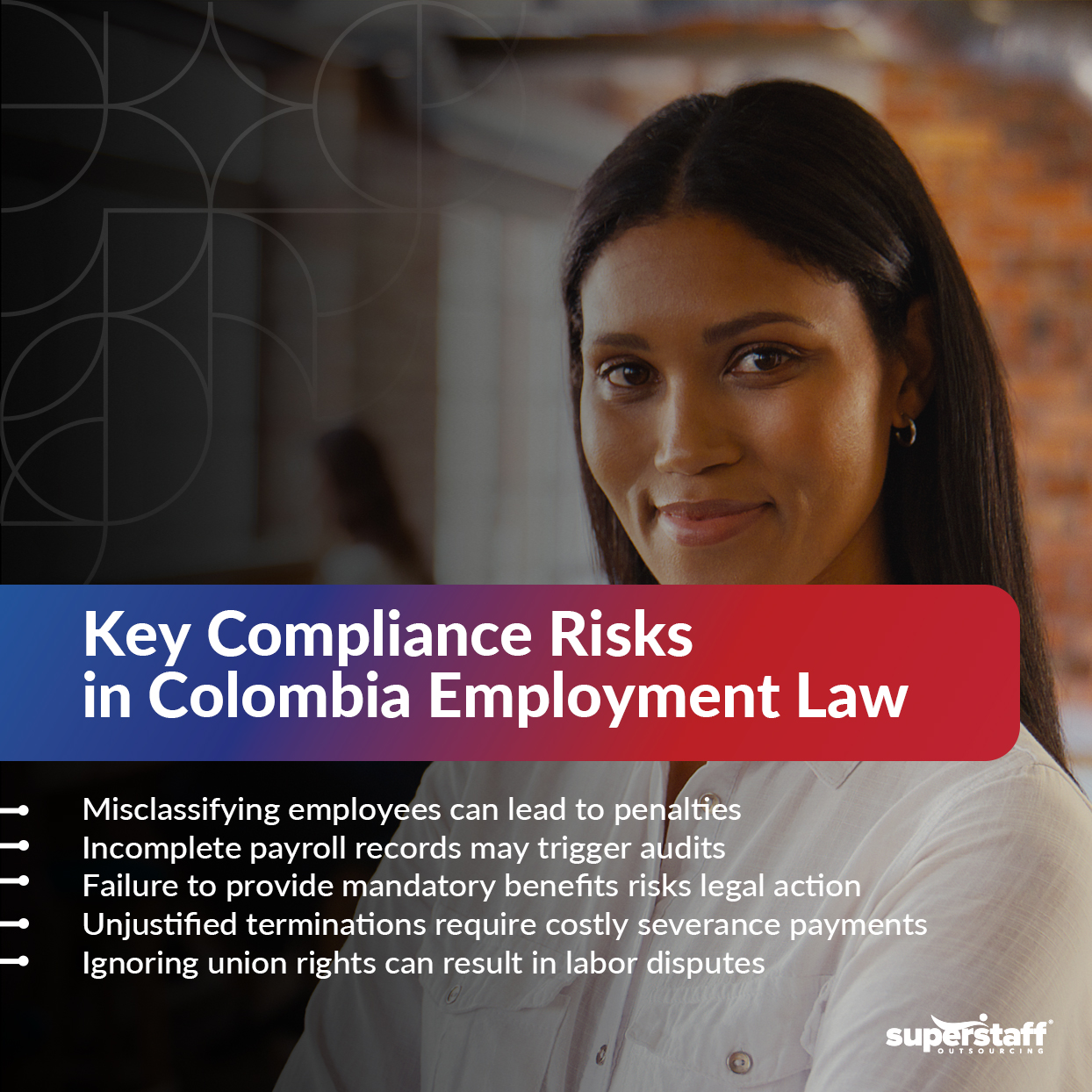
Expanding globally means new opportunities—but navigating Colombia’s complex employment laws can feel like charting unfamiliar territory.
As more companies eye nearshoring Colombia and other LATAM markets to complement their global expansion strategies, understanding the nuances of Colombia’s employment law becomes a strategic imperative. This isn’t just about staying compliant—it’s about building a stable, ethical foundation for long-term success.
Colombia employment laws are known for being highly protective of employees, and any misstep could jeopardize your expansion efforts. In this guide, we’ll walk you through what every business leader needs to know to avoid legal pitfalls and operate with confidence in Colombia.

Employment Contracts: The Legal Foundation of Expansion
In Colombia, a formal handshake just won’t cut it. Colombia’s employment law requires all job agreements to be in writing—clearly laying out roles, responsibilities, duration, and compensation.
The most common contract types are fixed-term, indefinite, and project-based. Fixed-term agreements need a specific timeline, while indefinite ones offer more flexibility but come with stronger employee protections. Vague terms or verbal deals? That’s a fast track to legal trouble. And it’s not just Colombia.
Globally, the rise of non-traditional work is reshaping employment dynamics—as an example, Forbes mentions that 11.9 million Americans, or 7.4% of the workforce, rely on independent contracting as their main job. Getting contracts right from day one isn’t just smart—it’s essential for sustainable growth.
Working Hours and Overtime: Strict Compliance Required
Colombian working hour rules aren’t just guidelines—they’re strictly enforced laws with serious consequences. The standard workweek runs 48 hours, usually across six days, and any overtime must be limited and paid at premium rates. Cutting corners or relying solely on payroll software to manage this? That’s a costly mistake.
Employment laws in Colombia require detailed tracking of every hour worked, and missing or inaccurate records can trigger fines or government investigations. One misstep and your entire operation could face unnecessary scrutiny. And here’s something global employers should keep in mind: Forbes reports that Gen Z workers now rank paid leave as their top priority, with 69% calling it a “must-have.” That’s a clear signal—compliance isn’t just about avoiding penalties; it’s about aligning with evolving employee expectations. Building a rock-solid timekeeping process from day one isn’t just operational hygiene—it’s part of building a company culture that works.
Leave Entitlements: More Than Just Time Off
Employee leave in Colombia extends well beyond standard vacation days. Colombia’s employment law mandates that employees receive 15 working days of paid annual leave for every year of service.
Additionally, female employees are entitled to 18 weeks of fully paid maternity leave, which includes at least one week of prenatal leave. Failure to comply with these regulations can result in penalties and even criminal sanctions. It’s essential not only to understand these laws but also to implement policies and HR protocols that reflect them. Clear communication and employee handbooks tailored to Colombian law can bridge that gap.
Social Security Contributions: A Non-Negotiable Obligation
In Colombia, social benefits aren’t perks—they’re mandatory. Employers must contribute to pensions, health insurance, occupational risk funds, and a family compensation fund, all calculated based on each employee’s salary. These payments must be made on time every month, with no exceptions.
Miss a deadline or underpay, and you could land on the radar of local authorities fast. For companies diving into Latam nearshoring, it’s a reminder that the real cost of hiring goes well beyond the paycheck. These benefits are essential not just for compliance but for employee trust and stability.
Globally, this social safety net plays a significant role—according to the Center on Budget and Policy Priorities, an estimated 96% of people aged 20–49 in covered jobs earned life insurance protection through Social Security in 2023. That kind of security matters everywhere, and in Colombia, it’s legally enforced.
Get this right, and you’re not just following the rules—you’re showing your workforce that you’re serious about their well-being.

Payroll Management: Accuracy Is Not Optional
In Colombia, payroll isn’t just about cutting checks—it’s a high-stakes process where every peso must be accounted for with precision. The law dictates strict rules on salary timelines, deduction limits, and electronic reporting. Even a small error, if left undocumented, can raise red flags during a labor audit and trigger cascading penalties.
Global companies can make the mistake of copy-pasting payroll systems from their home country, only to discover that deductions for pensions or health benefits weren’t aligned with Colombia employment law. That kind of oversight can be costly—not just financially, but reputationally.
And in today’s global economy, the details matter. As Forbes insightfully notes, payroll data has become one of the most misunderstood and misused data sets in business—frequently interpreted without proper context, leading to flawed decisions. That’s especially dangerous in cross-border operations.
If you’re working with a back office service provider in the Philippines, make sure they’re well-versed in Colombian compliance before they handle your payroll. In this space, precision isn’t just protection—it’s strategy.
Termination Rules: Strong Employee Protections in Play
Letting someone go in Colombia isn’t just a routine HR move—it’s a legal minefield if not handled correctly. Every termination must fall into one of two categories: justified, with clearly documented cause, or unjustified, which requires severance.
Dismissing an employee without proof of poor performance or misconduct? That can open the door to legal claims faster than you think. Even short-term hires are entitled to severance, and skipping proper documentation or notice can easily land you in court.
For global companies expanding into Colombia, this isn’t just about avoiding legal trouble—it’s about doing right by your people. Gartner reports that 82% of employees say their working environment lacks fairness, a striking stat that underscores how crucial it is to get termination processes right.
Fairness isn’t just a buzzword—it’s a business imperative. If you want to protect your employer brand and build a resilient, trusted team abroad, lawful and transparent terminations are non-negotiable.
Mastering Colombia Employment Law for Sustainable Expansion
Navigating Colombia employment law isn’t just about checking boxes—it’s about setting your business up for long-term success. From properly structured contracts and fair working hours to compliant payroll, terminations, and culturally aware practices, each piece plays a role in building a resilient and reputable operation. As this guide has shown, expanding into Colombia requires more than ambition—it demands informed action.
That’s where SuperStaff comes in. With our headquarters in Colombia and a deep understanding of the local labor landscape, we’re uniquely positioned to help global businesses expand with confidence. Whether you’re looking to build a bilingual customer support team, streamline back-office operations, or ensure compliance every step of the way, SuperStaff has the local expertise and global experience to be your strategic partner. Let’s make your expansion a success—reach out to SuperStaff today.






